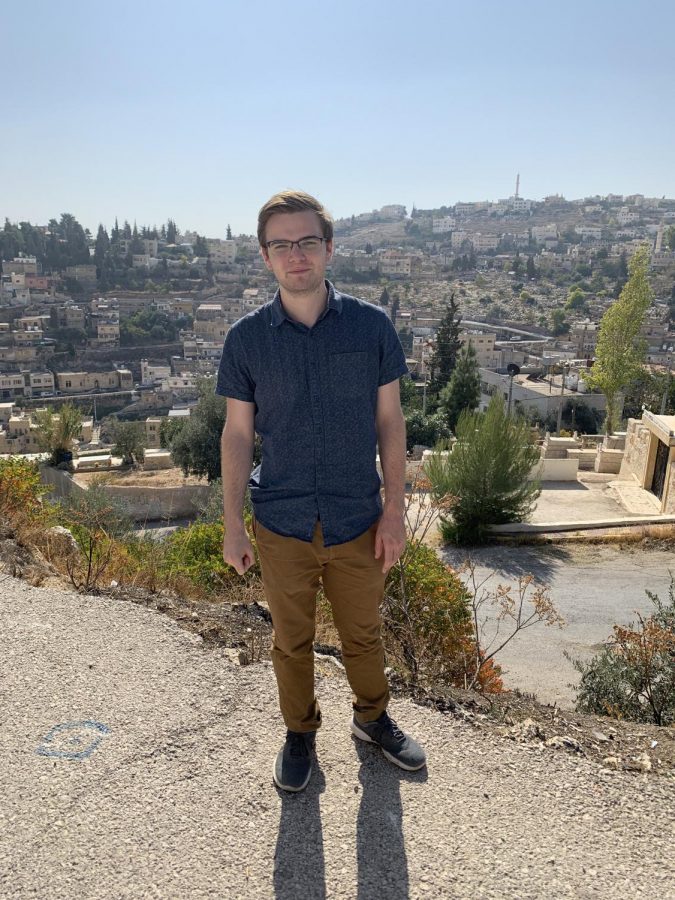Student Researches Tribal Law in the Middle East
Photo courtesy of Gregory Hopp
Gregory Hopp FCRH ’21 is doing Research while studying abroad in Jordan
Over 5,000 miles away, in Jordan, Gregory Hopp, FCRH ’21, is working on a research project that studies the actualities of tribal law in the Middle East.
Hopp wanted to do research since the beginning of his sophomore year, and originally applied to do a project regarding constitutionalism. He quickly realized that that topic was too large and decided to focus on tribes as governments in themselves.
Hopp said he spent last semester reviewing and interpreting literature regarding tribalism to determine if it is appropriate to describe a tribe as a democratic government. He then put the project on hold for the summer.
As a Middle East Studies major, Hopp found himself in Jordan this semester and thought about how he could make the most of his time there. One of his professors there has a brother who is a Sheik, a leader of an Arab tribe, and the opportunity to interview Sheiks and dive into the world of Arab tribes presented itself, he said.
He had the desire to understand this intricate system but decided not to look at it in a purely cultural way, he said. Instead, he decided to view it as someone who is studying law and wanted to put it in a concrete context.
“Because if we are able to see it as a real legal system and not just cultural, there is real potential for real integration of the tribes into the government for stability,” said Hopp.
He said his goal is to compile a code of law that people outside of the tribal system can understand. He said he also hopes to find a relationship between tribal law and the government in Iraq.
For now, Hopp is working on gaining contacts with other Sheiks and setting up interviews with them.
Hopp said he has been awaiting approval from the Institutional Review Board (IRB), which is an ethics review board for research, which has put his project on pause. While he waits, he has been speaking with Sheiks informally, gathering other contacts and reading about tribal law.
“The hope is that I will be able to do a few [interviews] the rest of this semester,” he said. “For the moment, it’s getting my toe in the water and talking to whoever I’m allowed to talk to.”
The worst-case scenario is that he has to do interviews over video chat when he returns to the United States, he said. Hopp’s interviews have a specific set-up, including questions in roughly four areas. He said three of the categories are more vague and experiential, such as how they were raised and trained. He also asks about personal views on the role of the tribe as a governing body and as a social group.
He said he hopes to also ask some of these questions to people with a lower status in the tribe to confirm if the Sheik’s answers are true or if they contain bias.
The final and most important part of the interview is about case law, according to Hopp. He plans to bring specific cases to the Sheiks. One case is marital, one is about divorce, one is a non-familial issue within the tribe (business or harassment) and one is extra tribal (a dispute between members of two different tribes). The next step is to take these cases, spend time with them, form hypothetical laws about them and follow up with the Sheiks in an email to confirm whether or not the laws are true.
Hopp said even professors who study tribal law would not be able to confirm the hypothetical laws because the way they are interpreted is so ingrained in cultural understanding. According to Hopp, it is more effective to compare and contrast case answers from different Sheiks.
“Effectively, much of Arab society in general, especially the Jordanian/Iraqi/Syrian region, is based on tribes and strict on family ties through the male line,” he said.
The tribes are the governing rule, but center more around family ties rather than land possession, Hopp said. The tribes used to be more violent, and wars and revenge were carried out on the tribal level. However, Hopp said they have recently been more peaceful, but each country is different.
“It’s a weirdly fluid social group that’s also a pseudo-government at the same time,” he said.
Hopp said that the tribal system is extremely culturally ingrained in the Middle East, but is very difficult for foreigners to understand. He said the lack of understanding about the system is an issue for foreign policy.
For example, he said a census has not been conducted in 10 years and the tribes do not seem to want one. Hopp said the moment they conduct one, then the United States has a way to find out information about the county.
He said tribes are the main obstacle for American foreign policy because as long as Americans do not understand how their society works, the United States can’t have an effective foreign policy.
“My hope is I can build into something worthwhile to read on foreign policy when voting,” Hopp said.
Once he gathers all of the information he needs from interviews, he will continue the process of analysis. He said he hopes he can do five times the amount of work in America that he can do in Jordan and is looking forward to continuing with the project.















































































































































































































